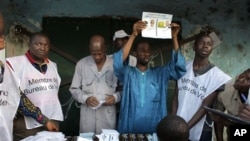The road to democracy has been bumpy for Guinea, but the European Union is supporting new development projects. The reinstated funding comes after the country's first free and fair elections, and a new bridge is becoming a symbol for democracy.
Less than five years ago, the people of Guinea suffered from, what's been called, the African disease: hunger, violent crime, and unemployment. And its government was in turmoil.
A December 2008 military coup threatened millions of euros in aid from the European Union. The EU suspended development funds until Guinea's government could prove it was stable.
Now it has. Guinea held free and fair elections late last year, putting President Alpha Condé into power. With a democratically-elected government, the EU renewed its funding pledge, and provided the money for a bridge between Guinea and Sierra Leone designed to improve trade between the two countries. EU Development Commissioner Andris Piebalgs was in Guinea this week to meet with political leaders. He explained why the Forecariah Bridge, over the Kissi Kissi River, is symbolic.
"I believe it's crucial," said Piebalgs. "The country have had first time free and fair presidential election, so that means with this support, we definitely demonstrate that democracy means also more cooperation with other nations in the world. Without these we wouldn't be here, there wouldn't be this bridge and our relations would be much more strained."
Excited crowds gathered for the inauguration of the bridge. Commissioner Piebalgs says there are high hopes for the project.
"For this local community, it gives them access to the markets," added Piebalgs. "So, because we also deal with some access roads, smaller roads to basically increase commercial capacity, but most importantly, it connects also the region. Sierra Leone is very close here so that connects Sierra Leone also with trade exchange."
Sierra Leone is just 30 kilometers away from the Guinean markets, and that, says businessman Mohamed Bah, means progress for Guinea.
"The Sierra Leonians come to Guinea to buy everything - rice, oil, soaps, everything in a way, for their businesses. This is where they come to buy," said Bah. "So they will be bringing money and carrying goods. So this is very good. It's making the Guineans develop economically."
With the country remaining calm, and with the EU commissioner pledging even more aid, Guineans hope the Forecariah Bridge is just the start of a new era of stability and prosperity.




